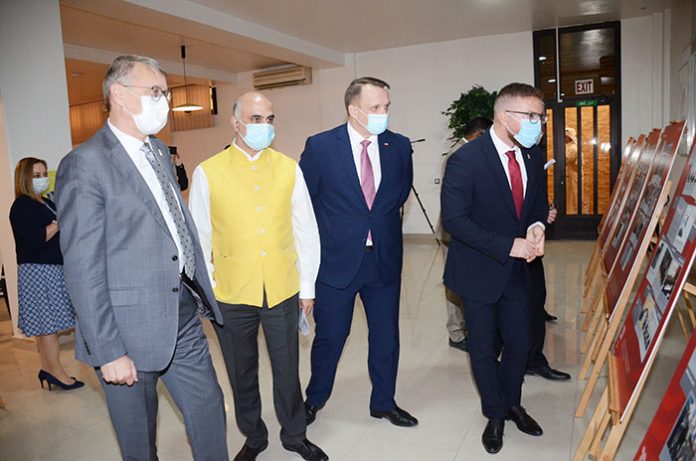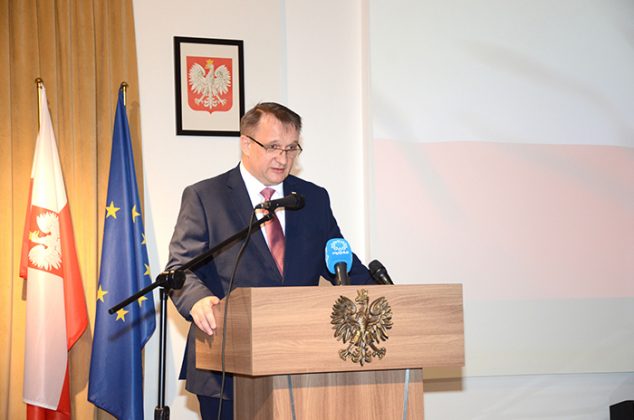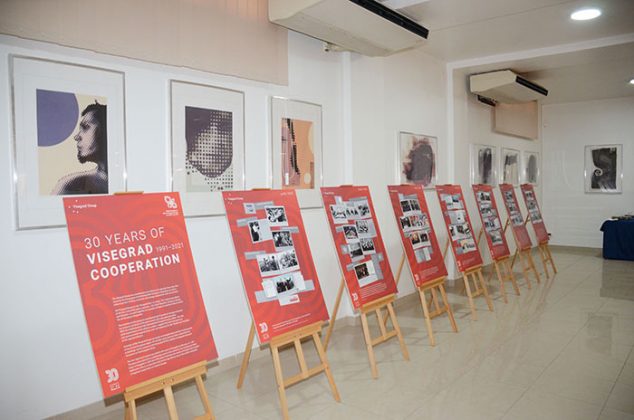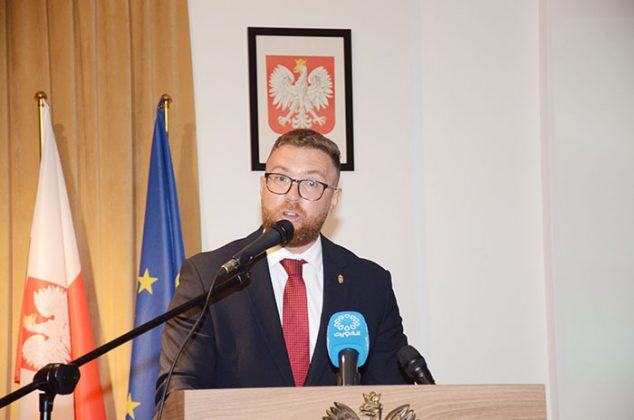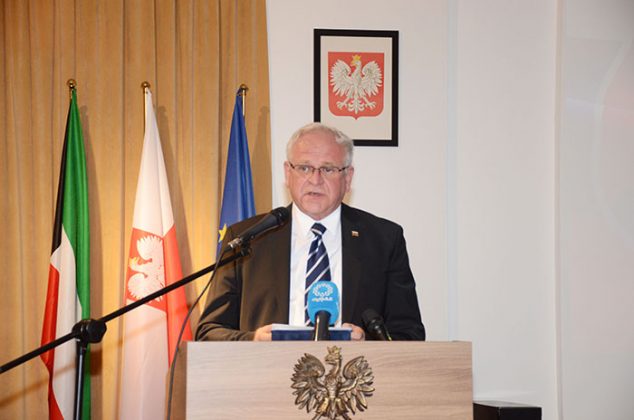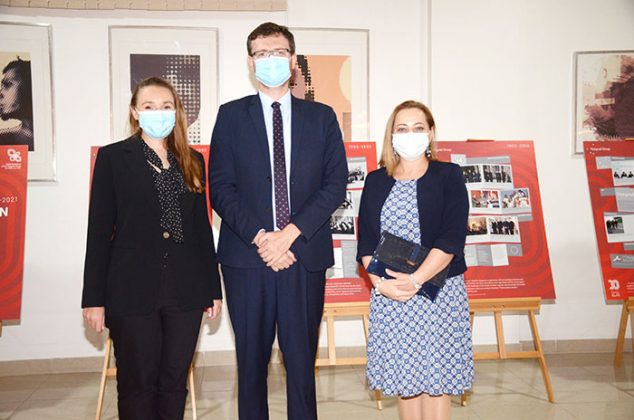V4 was a great example of Multilateralism and also had great similarities with GCC states can be emulated for the common betterment of their people through cooperation and alliances
Ambassador of Poland H.E. Pawel Lechowicz held a gathering of V4 (Visegrad Group) ambassadors at the Polish embassy last week to mark the 30th anniversary of the foundation of the grouping. On 15 February, 1991, the presidents of Czechoslovakia and Poland and the prime minister of Hungary signed the Visegrad Declaration, which marked the beginning of the V4 cooperation.
The Visegrad Group Jubilee took place during the Polish Presidency, which began on 1 July 2020. A short and impressive video presentation of each of the four countries was made to the select gathering at the Polish chancery and guests were able to see the great progress made by the V4 nations during the past 30 years.
The Visegrad Group was established as an alliance of originally three, later four countries for the purpose of furthering their European integration as well as advancing their military, economic and energy cooperation with one another.
The Visegrad Group reflects the efforts of the four Central European countries — the Czech Republic, Hungary, Poland, and Slovakia — to work together in a number of fields of common interest within the all-European integration.
Addressing the gathering Ambassador Pawel said that the annual presidency coincided with an unprecedented crisis in the world caused by the COVID-19 pandemic. The pandemic has put the functioning of societies to a severe test.
The motto of V4 cooperation during the Polish Presidency was ‘Back on track’, and our goal of building the image of the Central European region and V4 as a flexible and constructive partner remains an ongoing task. Dialogue is essential in these difficult times. Gestures of solidarity and goodwill also count. The next country to hold the presidency in the V4 Group is Hungary.

Ambassador Pawel further elaborated that the V4 countries exchange information and develop priority programs in order to better cooperate in an increasing number of areas. An important basic principle is that, within the EU, the V4 carry more weight as an alliance than they would as individual countries.
Nowadays Visegrad cooperation focuses on internal affairs in the region and takes place at the EU as well as other international organisations. It has resulted in establishing, among others, the Visegrad Battlegroup, the Visegrad Patent Institute and the Visegrad Prize awarded by V4 ministers of culture.
In his address to the gathering H.E. Ambassador Martin Dvorak of Czechia said that his country will always be proud of the idea of President Václav Havel of the then Czechoslovakia who put together three post-communist countries from the Central Europe and worked jointly on reaching the membership of the European Union as well as NATO. During this period, despite the split of Czechoslovakia, the main goal was reached and today the four countries, so called the V4 Group, are proud members of those prestigious alliances, feeling themselves responsible for their own destiny. We really appreciate that collaboration of the V4 has continued until the present time.
Ambassador of Hungary H.E. Istavan Gyula Soos told the gathering that the Visegrad Group, due to its unique historical background and increasing economic importance, will be one of the new emerging powerhouses of this new era. Our close cooperation during the pandemic will enable us to do a swift economic restart and to increase our competitiveness in the changing world, making, hopefully, the V4 alliance one of the winners of the upcoming years.
For his part, Ambassador of Slovakia H.E. Igor Hajdusek stated that “together we are stronger“, the history of the 30 years of existence is proof of the close cooperation, benefits, and the strength of V4.
The first high-level summit of V4 was held in the town of Visegrád on 15 February, 1991. The place was selected to symbolically connect the summit to the meetings of three kings in Visegrád in 1335 and 1336, which had been the results of lengthy and complex diplomatic efforts at that time and can be regarded as one of the earliest examples of regional cooperation in Central Europe. Six hundred years later the presidents of the Central European states formed the Visegrád Group.
Moreover, the Visegrad Group is a platform for exchanging experiences between V4 societies. That is why, the International Visegrad Fund (IVF) was established to facilitate links between them. For more than 20 years now the IVF supports the realisation of common projects, grants, artistic and literary programs.
As part of the celebrations of the 30th anniversary of the Visegrad Group, on 17 February 2021 a summit of the V4 prime ministers was held in Krakow with the participation of the President of the European Council Charles Michel.
The summit was an attempt to sum up thirty years of multifaceted cooperation of the Visegrad Group countries. Three decades ago at the Visegrad Castle a new chapter in the history of our four countries began. We have been together for around 360 months and we can say that history has come full circle. However, after these 360 months we are in a completely different place from where we started. The Visegrad Group is a story about unification with Europe, about strengthening and new great ambitions.
V4 and GCC comparison: In spite of the differences of the countries’ economic potential and geographical differences, there are certain similarities in the cooperation between V4 countries and GCC states:
Shared cultural and historic backgrounds: Influence of Western Christianity (Roman Catholicism), experience of II World War and post war communist regimes in V4 Group. Arab-Islamic roots of GCC states, as well as balancing influence between colonial powers (Ottoman Empire, UK).
Social and economic level of development: GCC economies are based on oil extraction and exports. V4 countries transitioned from socialistic methods of centrally controlled economies to the ideas of free market and freedom of entrepreneurship.
Goals: GCC seek new, other than oil-based development route for their economies. V4 Group states, as a major manufacturer of goods in Europe (heavy industry, automotive, agriculture) seek advancement to the high income – high productivity categories.
The activities of the group are coordinated by V4 countries’ foreign ministries but extend to all levels of the government and state administration. With the establishment of the International Visegrad Fund in 2000, support has also been given to non-governmental organizations and civil initiatives for the ’bottom-up’ building of the regional alliance.
Activities of the Visegrad Group are aimed at strengthening stability and prosperity in the Central European region. V4 member states perceive their cooperation as a value and a proof of their ability to integrate into such structures as the European Union.
An exhibition was also on display showcasing the history of the V4 nations.

